The SRS is delighted to announce the Biennial Book Prize 2024 goes to Carla Roth for Talk of the Town: Information and Community in Sixteenth-Century Switzerland (Oxford: Oxford University Press, Past and Present Book Series 2022).
The winner was announced at an online award ceremony, hosted by Ellie Chan and John Gallagher, which featured pre-recorded videos from each of the authors of the shortlisted books. Comments from the judges and the videos are available to watch below.
We would like to extend our congratulations to all who were shortlisted for their excellent books and invigorating books. Although it is commonplace for judges to say, this was a very difficult decision to reach. We had almost 50 submitted books and identifying a shortlist of five was no mean feat.
We were very impressed by all five of these books, each of them so different from one each other, but all of them attesting to vibrant and innovative approaches to the broad field of Renaissance Studies. The cross section of the field that they collectively offer should make us all feel positive about the future of Renaissance Studies and the potential for fresh insights and perspectives.
Reading for the SRS book prize gives us a sense of what it is to write an academic monograph today, and the range of ways that authors tackle the challenge. All five of these books cross disciplinary boundaries in different ways, offering bold new readings of both established and more overlooked topics. We were especially struck by the range of authorial voices we encountered – in itself a measure of how readers’ expectations can be confounded and scholarly conventions have become more flexible. All the books make significant new contributions, many extend traditional disciplinary boundaries, and all have something original to say.
Winner
Carla Roth, The Talk of the Town: Information and Community in Sixteenth-Century Switzerland (Oxford University Press, The Past and Present Book Series, 2022)
Carla Roth’s book creeps up on you. Focusing on the network of an educated linen trader from St Gall, and interrogating a rich source of personal notebooks kept over a number of decades, Roth teases out relationships 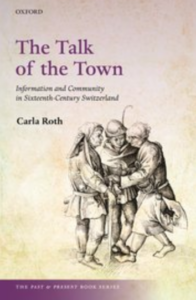 through the circulation of news, and the close reading of reported social interactions from gossip to jokes, from distant news to local events. We were really struck by the care and attention given to revealing the local and wider implications of a microstudy of place, and the commitment to sources and the people’s lives they are an account of that draws in the reader at every step. Innovative approaches are worn lightly – a digital analysis of the network is illuminating but doesn’t even take over the chapter in which it appears – and yet as the book progresses, so we become more invested in the everyday lives of Johannes Rütiner and his circle. This book is a model of scholarship. Understated yet ambitious, it offers a wholly original account through a close reading of a set of personal notebooks, used as a window into a community and its connections to the wider early modern world. This engagingly written and thoroughly researched study is a demonstration of the historian’s craft at its best.
through the circulation of news, and the close reading of reported social interactions from gossip to jokes, from distant news to local events. We were really struck by the care and attention given to revealing the local and wider implications of a microstudy of place, and the commitment to sources and the people’s lives they are an account of that draws in the reader at every step. Innovative approaches are worn lightly – a digital analysis of the network is illuminating but doesn’t even take over the chapter in which it appears – and yet as the book progresses, so we become more invested in the everyday lives of Johannes Rütiner and his circle. This book is a model of scholarship. Understated yet ambitious, it offers a wholly original account through a close reading of a set of personal notebooks, used as a window into a community and its connections to the wider early modern world. This engagingly written and thoroughly researched study is a demonstration of the historian’s craft at its best.
Shortlisted
Urvashi Chakravarty, Fictions of Consent: Slavery, Servitude, and Free Service in Early Modern England (University of Pennsylvania Press, RaceB4Race: Critical Race Studies of the Premodern, 2022)
This is a rich and revealing book that points to the local, everyday and ‘quintessentially English’ sources and concepts 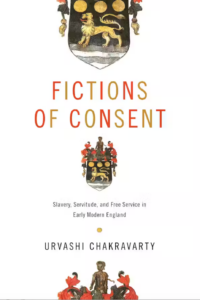 that underwrote and supported racialized theories of slaves and enslavement during the early modern period. Focussing on embedded fictions of consent, Chakravarty reveals the long history behind the vicious fallacy of the ‘happy slave’ of later centuries, and the deep-rooted complicity of English society in the ‘long ideological history of slavery … rooted in a set of everyday relations and sites of service’, from the household to the schoolroom. It is conceptually sophisticated and ambitious, taking in a range of sources from Shakespeare to Milton, from Roman comedy to English laws. It does powerful work in re-evaluating key ideas and practices of the period: reading it, ‘we discover in early modern literary and cultural texts a critical crucible for the conceptual architecture which generates early modern England’s futures of racialized slavery’.
that underwrote and supported racialized theories of slaves and enslavement during the early modern period. Focussing on embedded fictions of consent, Chakravarty reveals the long history behind the vicious fallacy of the ‘happy slave’ of later centuries, and the deep-rooted complicity of English society in the ‘long ideological history of slavery … rooted in a set of everyday relations and sites of service’, from the household to the schoolroom. It is conceptually sophisticated and ambitious, taking in a range of sources from Shakespeare to Milton, from Roman comedy to English laws. It does powerful work in re-evaluating key ideas and practices of the period: reading it, ‘we discover in early modern literary and cultural texts a critical crucible for the conceptual architecture which generates early modern England’s futures of racialized slavery’.
Heidi Hausse, The malleable body: Surgeons, artisans, and amputees in early modern Germany (Manchester University Press, 2023)
This is an absorbing book that excavates the craft-world of early modern surgeons as practitioners engaged with ne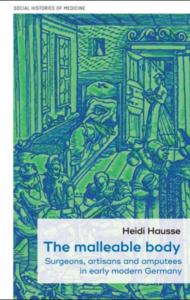 w technologies of the body. If the renaissance was the first age of gunpowder in Europe, it was also a new age of gunshot wounds, amputations and prosthetics. Hausse shows us the surgical artisan working alongside clockmakers and locksmiths to craft increasingly invasive surgical interventions in a multiplicity of different ways. Along with the artificial bodies that emerged, bearing iron limbs and mechanised joints, came a transformation of surgical ambitions and patients’ expectations. Drawing upon an imaginatively rich array of sources, Hausse traces the growth of a new perception of the body as an entity that could be artificially altered through surgical procedures. This is a captivating tale of how experiences born in trauma were crafted with characteristic renaissance artistry and ingenuity into a new aesthetic of the malleable body that now lies at the very heart of modern biomedicine.
w technologies of the body. If the renaissance was the first age of gunpowder in Europe, it was also a new age of gunshot wounds, amputations and prosthetics. Hausse shows us the surgical artisan working alongside clockmakers and locksmiths to craft increasingly invasive surgical interventions in a multiplicity of different ways. Along with the artificial bodies that emerged, bearing iron limbs and mechanised joints, came a transformation of surgical ambitions and patients’ expectations. Drawing upon an imaginatively rich array of sources, Hausse traces the growth of a new perception of the body as an entity that could be artificially altered through surgical procedures. This is a captivating tale of how experiences born in trauma were crafted with characteristic renaissance artistry and ingenuity into a new aesthetic of the malleable body that now lies at the very heart of modern biomedicine.
Emanuele Lugli, Knots, or the Violence of Desire in Renaissance Florence (The University of Chicago Press, 2023)
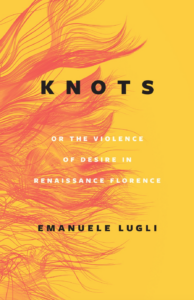 Emanuele Lugli’s intriguing and well structured interdisciplinary study of hair in the late fifteenth century art and society of Florence moves deftly between well-known paintings, literary texts, scientific accounts and metaphorical and descriptive evidence from popular sermons. The book adopts a bold voice that invites a confidential dialogue with the reader, often breaking the “fourth wall” between historical interpretation and our modern conceptions, in so doing challenging the conventions of academic writing through an attention to the positionality of the author in relation to the subject of study. Rich with insights that move across the disciplines of art history, literature and history of science, it is a book that makes us care about hair.
Emanuele Lugli’s intriguing and well structured interdisciplinary study of hair in the late fifteenth century art and society of Florence moves deftly between well-known paintings, literary texts, scientific accounts and metaphorical and descriptive evidence from popular sermons. The book adopts a bold voice that invites a confidential dialogue with the reader, often breaking the “fourth wall” between historical interpretation and our modern conceptions, in so doing challenging the conventions of academic writing through an attention to the positionality of the author in relation to the subject of study. Rich with insights that move across the disciplines of art history, literature and history of science, it is a book that makes us care about hair.
Robert Stagg, Shakespeare’s Blank Verse: An Alternative History (Oxford University Press, 2022)
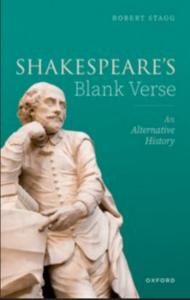 A beautifully articulate, extensively researched and utterly compelling alternative history of blank verse, this book speaks to readers not just of Shakespeare but of English Renaissance writing more generally. For a ‘Shakespeare book’, it brilliantly decentres Shakespeare from the established literary history of blank verse by locating him among the voices and efforts of his contemporaries, taking their work (and contemporary critiques of Shakespeare) seriously by investigating the stakes of literary form and metre in the evolving tradition of English writing, not just in drama. In also looking to European traditions, and with an enjoyable line in parenthetical aperçus and modern parallels, Stagg generates original and important new readings not just of familiar Shakespeare plays, but also of pivotal, now-forgotten texts like George Gascoigne’s The Steel Glass. This new book revitalizes an old subject with erudition and panache, going far beyond Shakespeare in its ambitions and reach.
A beautifully articulate, extensively researched and utterly compelling alternative history of blank verse, this book speaks to readers not just of Shakespeare but of English Renaissance writing more generally. For a ‘Shakespeare book’, it brilliantly decentres Shakespeare from the established literary history of blank verse by locating him among the voices and efforts of his contemporaries, taking their work (and contemporary critiques of Shakespeare) seriously by investigating the stakes of literary form and metre in the evolving tradition of English writing, not just in drama. In also looking to European traditions, and with an enjoyable line in parenthetical aperçus and modern parallels, Stagg generates original and important new readings not just of familiar Shakespeare plays, but also of pivotal, now-forgotten texts like George Gascoigne’s The Steel Glass. This new book revitalizes an old subject with erudition and panache, going far beyond Shakespeare in its ambitions and reach.
